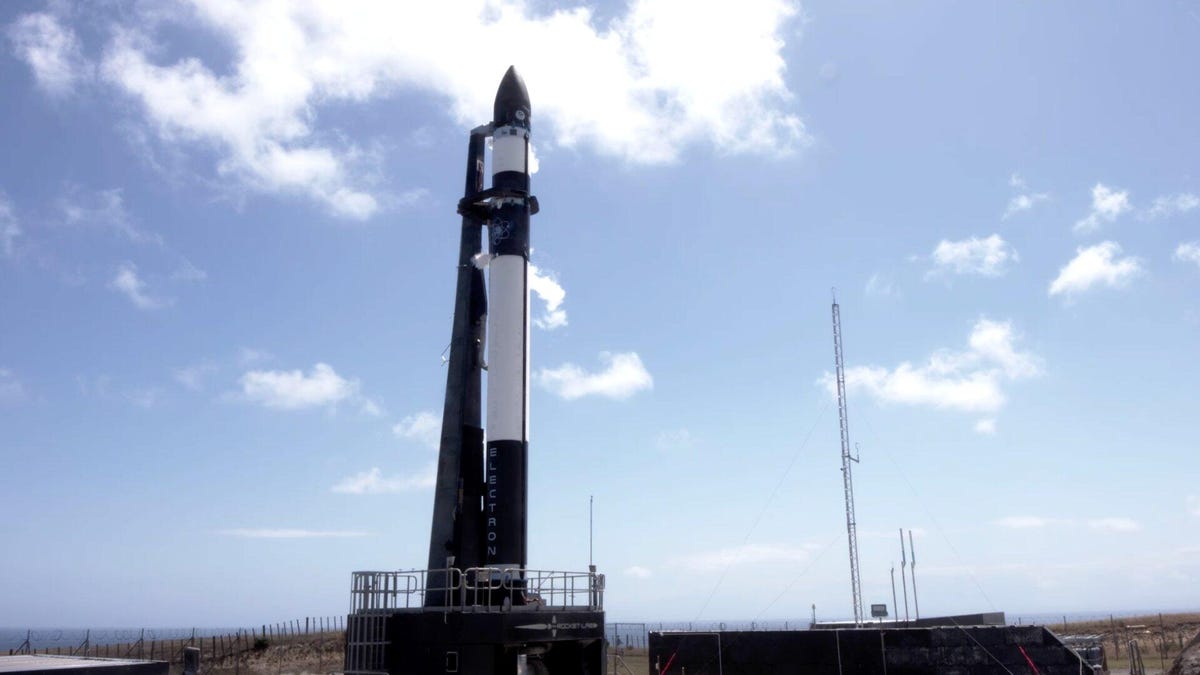Rocket Lab races to catch up with SpaceX by going rocket fishing
The space launch startup is taking a few pages from Elon Musk's playbook, but doing it differently.

A Rocket Lab Electron rocket awaits liftoff in New Zealand.
In the space launch business, Elon Musk and SpaceX grab most of the headlines, but plucky New Zealand-American outfit Rocket Lab and its affable CEO Peter Beck are making up ground quick. This weekend the company will attempt to recover one of its orbital rockets after delivering a payload to orbit for the second time in its latest mission called Running Out of Toes.
SpaceX has established an advantage for itself by perfecting rocket recycling, and earlier this year, Beck confirmed his company would pivot to begin reusing its boosters as well.
Last November, a mission dubbed Return to Sender saw Rocket Lab perform a soft splashdown landing of one of its Electron rockets in the Pacific Ocean. It was a tentative first step in developing a new recovery process that will eventually see the company's rockets blast to space, then begin a high-drama return to Earth involving both parachutes and a helicopter that snatches the spent booster from the sky for recycling.
But for now, Beck says the plan is just to get the wet recovery right before getting any extra aircraft involved.
"There's no point in bringing in a helicopter until we're really happy with the condition of the stage," the Kiwi told reporters on a Zoom call Tuesday.
When the Rocket Lab team went to pull the Electron first stage from the Pacific Ocean after the Return to Sender mission, the effort was complicated by 16-foot (5 meter) swells, and the booster suffered some damage in the process. This time Rocket Lab is using something called ORCA (for Ocean Recovery and Capture Apparatus), which is a hydraulic cradle on the recovery ship to help things go a little more smoothly when the team hauls that very big fish on board.
Beck told the media that the company did manage to harvest some of the components from Return to Sender. The propellant pressurization system that flew on that mission will be used for Running Out of Toes this weekend.
In addition to practicing the wet recovery, Rocket Lab is working to keep its rockets from overheating on re-entry. The Electron is a much smaller rocket than the SpaceX Falcon 9, leaving no room for employing a propulsive landing system using engine firing to guide the booster back to the surface. Instead, the Electron relies on using the atmosphere to slow down as much as possible, which means one of the biggest challenges is dealing with the extreme heat generated by pushing so forcefully against all that air.
Beck said a future upgrade will include a new decelerator designed to reduce the thermal load of re-entry by a factor of 10.
That decelerator should be ready by the time Rocket Lab performs a third splashdown recovery sometime later this year. If that goes really well, then the company may be ready to move on the daring helicopter maneuver, which Beck said isn't actually all that daring.
"[The helicopter recovery] is not that tricky to do," he said, explaining that the logistics of coordinating a helicopter and recovery ship with the landing represented a far bigger challenge.
Beck said everything the company learns from its experiments in recycling rockets will inform the development of its next-generation vehicle, Neutron, which is a far larger booster designed to actually go head-to-head with the likes of Falcon 9 and others.
But first, Rocket Lab needs to perfect its fishing technique.
The launch window for Running Out of Toes from the company's New Zealand launch site opens Saturday at 3 a.m. PDT. The mission will be streamed live and we will embed the feed here once it becomes available.
Follow CNET's 2021 Space Calendar to stay up to date with all the latest space news this year. You can even add it to your own Google Calendar.

